九年级英语上册Unit5复习
初中英语九年级上册Unit5Artworld知识点总结新版牛津版
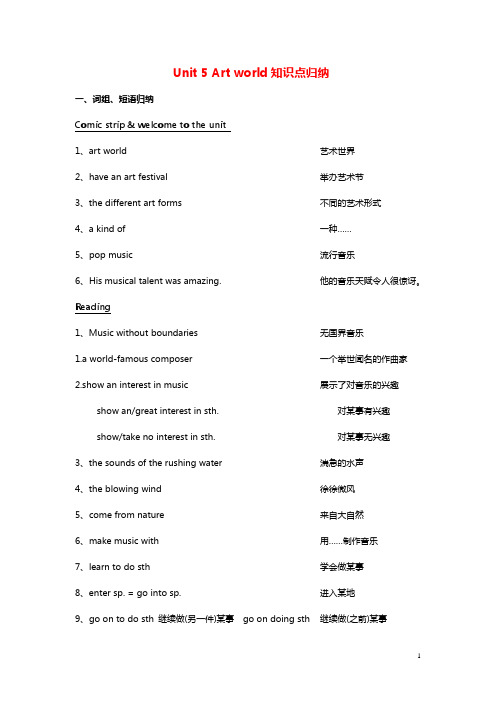
Unit 5 Art world知识点归纳一、词组、短语归纳Comic strip & welcome to the unit1、art world 艺术世界2、have an art festival 举办艺术节3、the different art forms 不同的艺术形式4、a kind of 一种……5、pop music 流行音乐6、His musical talent was amazing. 他的音乐天赋令人很惊讶。
Reading1、Music without boundaries 无国界音乐1.a world-famous composer 一个举世闻名的作曲家2.show an interest in music 展示了对音乐的兴趣show an/great interest in sth. 对某事有兴趣show/take no interest in sth. 对某事无兴趣3、the sounds of the rushing water 湍急的水声4、the blowing wind 徐徐微风5、come from nature 来自大自然6、make music with 用……制作音乐7、learn to do sth 学会做某事8、enter sp. = go into sp. 进入某地9、go on to do sth 继续做(另一件)某事go on doing sth 继续做(之前)某事10、get to know 了解11、be known for …be famous for …因……而著名12、a piece of music 一首音乐13、the speed of water flow 水流的速度14、create different pictures in different minds 在不同的脑海里会产生不一样的画面15、build a bridge between the East and the West 在东西放之间搭建了一座桥梁16、bring sth together 把某物放在一起17、traditional Chinese music 传统的中国音乐18、in a Western style 用西方的风格19、In his works 在他的作品中21、modern Western music 现代西方音乐22、mix together 融合在一起23、make a new type of music 制作一种新的音乐24、A dividing line 一条分割线25、if necessary 如果有需要26、Each time a medal was presented to a winner, the award music was played.每次给获奖者发奖牌时,颁奖音乐就会响起。
最新人教PEP版九年级上册英语Unit 5 What are the shirts made of?-单元知识点归纳

Unit 5 What are the shirts made of?Section A(1a-2d)必背单词1. cotton n.棉;棉花2. leaf n. 叶;叶子→pl. leaves3. produce v.生产;制造;出产→be produced in 在某地生产4. widely adv.广泛地;普遍地→ wide adj. 宽的;→ how wide 多宽;wide adv.充分地→open your eyes wide睁大眼睛→ be widely known/ used被广泛地知道/使用5.glass n.玻璃6. coin n.硬币7. fork n.餐叉;叉子8.blouse n.(女式)短上衣;衬衫9.chopstick n.筷子10. steel n.钢;钢铁11.fair n.展览会;交易会12.grass n.草;草地13.process v.加工;处理n.过程必背短语14.be made of...由……制成15.be made in在……被制造16.environmental protection环境保护17.be made from由……制成18.be famous/known for 以……闻名;为人知晓19.be produced in在……生产20.as far as I know据我所知21.by hand手工必背句子22.—Is it made of silver?它是由银制成的吗?—Yes,and it was made in Thailand.是的,并且它是泰国产的。
23. Where is tea produced in China?中国哪里产茶叶?24.For example,Anxi and Hangzhou are widely known for their tea.例如,安溪和杭州都以它们的茶叶而广为人知。
25.Well, as far as I know,tea plants are grown on the sides of mountains.哦,据我所知,茶树被种植在山坡上。
人教版九年级英语上册Unit5语法知识点短语作文
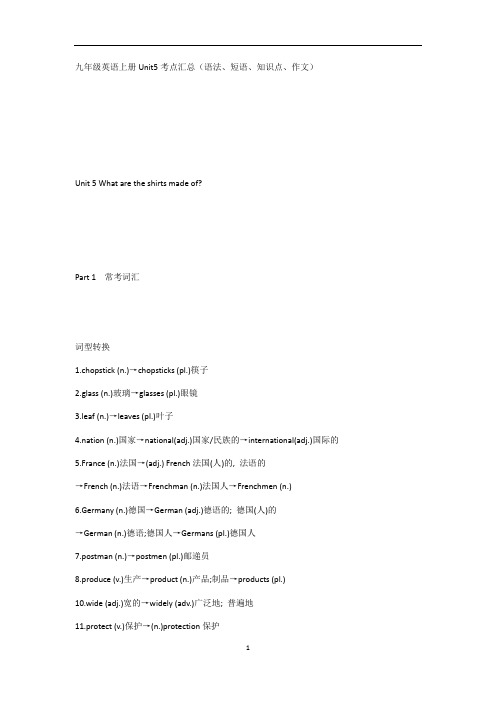
九年级英语上册Unit5考点汇总(语法、短语、知识点、作文)Unit 5 What are the shirts made of?Part 1 常考词汇词型转换1.chopstick (n.)→chopsticks (pl.)筷子2.glass (n.)玻璃→glasses (pl.)眼镜3.leaf (n.)→leaves (pl.)叶子4.nation (n.)国家→national(adj.)国家/民族的→international(adj.)国际的5.France (n.)法国→(adj.) French法国(人)的, 法语的→French (n.)法语→Frenchman (n.)法国人→Frenchmen (n.)6.Germany (n.)德国→German (adj.)德语的; 德国(人)的→German (n.)德语;德国人→Germans (pl.)德国人7.postman (n.)→postmen (pl.)邮递员8.produce (v.)生产→product (n.)产品;制品→products (pl.)10.wide (adj.)宽的→widely (adv.)广泛地; 普遍地11.protect (v.)保护→(n.)protection保护pete (v.)竞赛→competitor (n.)参赛者→competition (n.)比赛13.history (n.)历史→historical (adj.) (有关)历史的14.celebrate (v.)庆祝→(n.)celebration庆典;庆祝活动【可】15.color (n.)颜色→(adj.) colorful色彩鲜艳的16. environment (n.)环境→environmental (adj.)自然环境的Part 2 短语归纳Section A1. be made of…由…制成(可以看出材料)be made from…由…制成(看不出材料)be made in+地点/时间在某地/某时制造be made by+人由某人制造be made into…被制成…(into后接制成的产品)be made with…用(工具)来制造2. be famous for = be known/well-known for 因…而闻名3. be famous as = be known/well-known as 作为…而闻名4. the art and science fair 科学艺术展5. in many different areas在许多不同的地区6. as far as I know = according to what I know 据我所知7. on the sides of mountains 在山坡上8. do sth. by hand 手工做…9. be good for 对…有好处10.be good at (doing) sth.=do well in (doing) sth. 擅长(做)…get better at (doing) sth. 变得更擅长于(做)…11. search for= look for 搜寻, 寻找12. avoid doing sth. 避免做…13. everyday things 日常用品14. high-technology products 高科技产品14. in all parts of the world 在世界各地15. things made in China 中国制造的东西16. be allowed to do sth. 被允许做…17. children under 18 18岁以下的孩子18. on the last Friday of each month 每个月的最后一个周五19. careless driving 粗心驾驶20. traffic accidents 交通事故21. in fact=actually事实上22. environmental protection 环境保护23. a model plane飞机模型24. all over the world全世界25. find it+形容词+that从句发现…怎么样find it+形容词+to do sth. 发现做某事…怎么样Section B1. go on a vacation (to sp.) 去(某地)度假2. many different kinds of kites 不同种类的风筝3. fly a kite=fly kites 放风筝make a kite 制作风筝4. the international kite festival 国际风筝节5. be held in+地点/时间在某地/某时被举行6. be painted with colorful drawings 被涂上了彩色图案7. beauty in common things 普通事物中的美8. according to…根据…, 按照…9. sky lanterns 孔明灯10. sent out 送出, 发出11. be covered with…由…所覆盖12. rise into the air 升上天空13. be seen as = be regarded as…被看成…14. Chinese clay art 中国陶艺15. Chinese fairy tale 中国童话故事16. historical story 历史故事17. be shaped by hand 被手工塑形18. at a very high heat 以非常高的温度19. turn…into…把…变成…20. a beautiful piece of art 一件精美的艺术品21. traditional Chinese art forms 传统的中国艺术形式22. at midnight 在午夜23. a city famous for kites 一个因风筝而闻名的城市24. bright symbols of happiness 幸福的光明象征Part 3 知识点总结01be famous for =be known/well-known for 因…而闻名be famous as =be known/well-known as 作为…而出名be famous to =be known/ well-known to 为…所熟知02seem( to be) + adj. 似乎是…seem to do sth. 似乎要去做某事It seems/seemed that从句似乎, 好像…03light①n. 灯【可】; 光,光线【不可数】②adj. 明亮的, 轻的③v. 点燃, 点亮( lit ,lit / lighted, lighted )04be used for (doing)sth.= sth be used to do 被用来做…05both…and……和…都…(连接两个并列主语时谓动为复)not only…but also…不但…而且…连接两个并列成分either…or…或者…或者…作主语时,谓动遵循neither…nor …既不…也不…就近一致原则06whatever=no matter what无论什么(用来引导让步状语从句)no matter who = whoever 无论谁no matter when = whenever 无论什么时候no matter where = wherever 无论在哪儿07find it + adj. + to do sth. 发现做某事怎么样find it + adj. + that从句发现…怎么样(it是形式宾语)find sb. doing sth. 发现某人正在做某事08everyday (adj.) 每天的, 日常的(用在名词前做定语) every day = each day 每天(位于句首/句末作时间状语)daily①adj.=everyday 每天的②adv.=every day 每天地eg. She watches everyday English on TV every day.09allow doing sth 允许做某事allow sb. to do sth 允许某人做某事be (not) allowed to do sth . (不)被允许做某事eg. It’s not allowed to smoke here . 这儿不允许吸烟10continue to do sth . 继续做另一件事情continue doing sth . 继续做原来的事情11in trouble 处于困境中in danger 处于危险中in silence默默地in excitement兴奋地12send out 放出,发送send up 发射send for 派人去请send sb. sth = send sth to sb. 送给某人某物send sb. to sp. 送某人去某地13have / has been around for+时间段已经存在多上时间14put…on…把…贴/放在…上put away 把...收起来,放好put on 穿上,上演put off 推迟,延期put out 熄灭put down 放下put up 张贴, 举起, 搭建15lively(指物) 生动的, 鲜艳的, 生机勃勃的(指人) 活泼的, 活跃alive活着的(指人/物)→(反)dead16learn to do sth. 学习做某事learn from向…学习learn…by oneself=teach oneself自学learn about了解/知道…17form①n. 表格Please fill in the form.②v. 建立,组成They formed an English club.Part 4 重点语法Grammar Focus:passive voice in present tense(现在时的被动语态)一语态的定义及分类:英语动词有两种语态:主动语态(Active Voice):当主语为动作的执行者时,谓语用主动语态。
人教版九年级上册英语Unit 5 知识点过关及答案

人教版九年级上册英语Unit 5 知识点过关一.重点句子(15分)1.不管他多忙,他总是乐意帮助别人。
bus y he is, he is always ready to help others.2.他发现有趣的是,当地商店里的很多产品都是中国制造的。
He found so many productswere made in China.3.——你的衬衫是棉质的吗?——是的。
它们是中国制造的。
—your shirts cotton?— Yes, they are. And they were made in China.4.——这架模型飞机是用什么制成的?——它是由使用过的木头和玻璃制成的。
—the model plane made of?— It's made of .5.——茶是怎样生产出来的?——茶树生长在山坡上。
当茶叶成熟时,它们被手工采摘下来,然后被送去加工。
—tea ?— Tea plants on the sides of mountains. When the leaves are ready, they by hand and then for processing.6.这本书能教你如何制作风筝。
This book can teach you . 7.我们如何把水变成蒸汽?How can we water vapor?8.依照交通法规,人们禁止酒后开车。
the traffic laws, people mustn't drive after drinking wine or beer.9.嘲笑困境中的人是错误的。
It's wrong to laugh at people when they are .10.它们被看作是幸福和美好祝愿的光明象征。
They are seen as and.二、单元基础知识过关Ⅰ.单项选择(10分)( )1. Although he's now an old man, he's still very strong and .A. deadB. angryC. strangeD. lively( )2. The man was able to keep his anger in(控制怒气) to a fight.A. avoidB. makeC. seeD. punish( )3. Look at this new car. It is made Chengdu.A. inB. ofC. fromD. by( )4.— What is he busy doing?— Doing the experiment the science project.pletespletedpletingD. to complete( )5.— What this kind of bottle ?— Glass.A. does; make inB. does; make ofC. is; made inD. is; made of( )6. Flowers along the road every year.A. plantB. plantedC. are plantedD. were planted( )7.— Hey, man. You can't cross the street now. You have to wait the traffic light turns green.— Oh, sorry and thank you.A. whenB. ifC. untilD. while( )8.— How is your pet dog?— He is lovely. But if he at home all day, he at me angrily.A. keeps; barksB. is kept; will bar kC. is kept; barkD. keeps; will bark ( )9. The girl is afraid to dance in public because she thinks she may be .A. laughed atB. waited forC. heard ofD. agreed with( )10.— Can I park my car here, sir?—. You see, there's much traffic here.A. Never mindB. You’d better notC. Of course notD. Yes, pleaseⅡ.根据句意及首字母或汉语提示完成单词(15分)1. The sun provides us with light and h .2. You need a pair of s to cut it off.3. Guilin is a famous city. It is k for its beautiful mountains and water.4. Do you know who was the first person to set foot on the s of the moon?5. My aunt asks me whether I like a woolen sweater or a c one.6. The man put an advertisement in the (当地的) paper to sell his car.7. The Internet has become part of our (日常的) life.8. The art and science (展览会) will be held in this city.9. Every driver must obey the (交通) rules.10. I bought a pair of earrings made of (银) the day before yesterday. Ⅲ.用括号中所给单词的适当形式填空(10分)1. They held a great ( celebrate) in the square on New Year's Eve.2. Paris is the capital of ( French). It's a beautiful city.3. I have a pretty cat. It has ( it) own name.4. Tea ( process) requires both technique and artistry.5.— Where do these people work?— In the post office. They are ( postman).6. My father gave me a ( move) phone as my birthday gift yesterday.7. Miss Yang always makes her classes ( live) and interesting.8. In the past he often made his sister , but now he is often made by his sister.( cry)9. We Chinese like eating with ( chopstick).10. English is an important ( national) language.Ⅳ.补全对话(10分)A: Hello, Mrs. Smith! Welcome to my house.B: Thanks for your invitation, Mrs. King.A: Please have a seat. 1B: Sure.A: 2B: Some Pu’ er would be great, thanks.A: Sure. I just got some from my Chinese friend. He is from Yunnan and he bought it in a shop there.B: Oh, 3A: You' re right. Chinese tea is drunk by people all over the world.B: Wow, this cup is beautiful and a little heavy. 4A: It is made of silver. I have many tea sets like this. 5B: Sounds like a great hobby.A. What's it made of?B. I know China is famous for tea.C. I'm interested in collecting them.D. What kind of tea would you like?E. Would you like some tea?1. 2. 3. 4. 5.三、单元知识中考链接Ⅰ.根据句意及首字母提示完成单词(5分)1.The first kite was m of wood in history.2.The traffic is terribly busy in the morning. You’d better avoid d the center of the city.3.When talking to British people, we should a subjects like age. weight or money.4.It only t me half an hour to walk to school every day last term.5.Students are not a to eat in class. We should follow the school rules. Ⅱ.用括号中所给单词的适当形式填空(5分)1.Smoking ( not allow) in public.2.A baby's first month birthday is a special event in China and( celebrate) with a special party.3. Monkeys eat meat, ( leaf), fruit and even eggs.4.The old saying“A fall into a pit, a gain in your wit.” means we should learn from mistakes and avoid ( make) the same mistakes again.5.These days, Zibo is ( wide) known for its barbecue(烧烤).Ⅲ.完成句子(5分)1.(为了避免碰到卡车,他撞到了墙上,胳膊伤得很厉害。
期末考试复习——人教版九年级英语上册课本Unit5知识点汇总

期末考试复习——人教版九年级英语上册课本Unit5知识点汇总【重点短语】1. be made of 由……制造2. be made in 在……制造3. environmental protection 环境保护4. be famous for 以……而著名5. be produced in 在……生产6. be known for 以……闻名7. as far as I know 据我所知8. pick by hand 手工采摘9. send for 发送10. avoid doing sth 避免做某事11. everyday things 日用品【考点详解】1. made of 由……制(构)成,后接构成某物质的原料。
例:This skirt is made of silk.这件裙子是用丝绸制成的。
be made of/from/up of的区别(1)be made of 表示制成成品后,仍可看出原材料是什么,保留原材料的质和形状,制作过程仅发生物理变化。
例:The kite is made of paper.风筝是用纸做的。
(2)be made from 表示制成的东西完全失去了原材料的外形或特征,或原材料在制作过程中发生化学变化,在成品中已无法辨认。
例:The paper is made from wood.纸是木头做的。
Butter is made from milk. 黄油是从牛奶中提炼出来的。
(3)be made up of 用……构成或组成的,指人、物皆可,指结构成分。
例:Our class is made up of six groups. 我们班是由六个小组组成的。
2. It seems that many people all over the world drink Chinese tea. 好像全世界的许多人都在喝中国茶。
句型"It seems that…"意为"看起来好像/似乎……",其中seem是连系动词,意为"似乎;好像",句型中的it是形式主语,不能用其他代词来替代。
九年级英语上册Unit 5重点词汇短语句型

3. —What kind of music do you _____________?—I prefer pop music.—你最喜欢哪种音乐?—我更喜欢流行音乐。
4. Because he was the King of Pop. His __________ was amazing.因为他是流行音乐之王。
他的音乐天赋太棒了。
Reading【核心单词】1. ____________vt. 颁发;提交2. ____________n. 乐器;工具;器械3. ____________adj. 普通的,一般的,常见的4. ____________n. 物品,东西5. ____________n. 石头6. ___________vt. 控制,支配7. ____________n. 钟,铃8. ___________conj. 虽然,尽管【单词变形】1. present—__________(过去分词)2. centre—___________(形容词)3. music—___________(名词)4. win—__________(动词的ing形式)__________(名词)5. successful—___________(副词)6. tradition—___________(形容词)7. west—___________(形容词)8. boundary—____________(复数)【核心短语】1. ____________音乐无国界2. ____________被颁发给某人3. ____________一个世界闻名的作曲家4. ____________在湖南中部5. ____________对某事有兴趣6. ____________乐器7. ____________继续做某事8. ____________用普通东西创作音乐9. ____________慢慢了解10. ___________因……而闻名11. ___________通过控制……的速度12. ___________水流13. ___________一个古老的中国编钟14. ___________混合到一起15. ___________用一种西方的风格16. ___________形成一个新的类型17. ___________最伟大的作曲家之一18. ___________在他的作品中19. ___________为……作曲【核心句型】1. He loves ___________ and the blowing wind because, to him, the best music _____________.他喜欢流水的声音和风的吹拂,因为对他来说,最好的音乐来自大自然。
九年级英语上册unit5-8复习试卷(含答案)

牛津译林版九年级英语上册9A unit5-8 单元练习卷一、选择填空(满分35分)A)单项填空(共25题,每小题1分;满分25分)1.Tom has _________ honest face, and, in fact, he never tells ________ lies or plays tricks onothers.A. a; theB. an; /C. the; /D. an; the2.Two gentlemen came in, and ________ man was carrying a suitcase.A. bothB. eachC. everyD. all3.He says his mother will be back ________ half an hour.A. inB. afterC. atD. for4.—I’m sorry you have missed the bus. It ________ ten minutes ago.—What a pity!A. was leavingB. has leftC. leftD. went to5.—Sonia, is this your dictionary?—Oh, it’s not ________. Ask Amy, she is looking for ________.A. me; hersB. mine; herC. my; hisD. mine; hers6.She looked at me in surprise ________ I opened the door.A. asB. whileC. sinceD. at7.Your teeth are not in good condition. ________ your milk without sugar?A. Why you have notB. Why have you notC. Why have notD. Why not have8.One ought ________ for what one hasn’t done.A. not to be punishedB. to not be punishedC. to not punishedD. not be punished9.I won’t leave my office until my work ________.A. finishB. will finishC. will be finishedD. is finished10.—Why didn’t Mary come to the party last night?—I didn’t know ________.A. why didn’t sheB. why she didn’tC. why did sheD. why she did11.It ________ ten years since we last ________ in Nanjing.A. was; metB. has been; metC. was; ;meetD. is; meet12.By the time I arrived at the hall, the meeting ________ for one hour.A. beganB. had beganC. has been onD. had been on13.Would you mind speaking ________ quickly? I can’t follow you.14.I’m sorry to ________ what you say.A. not agree withB. disagree withC. not disagree toD. agree to15.The dresses sold in the other shop will be ________, but ________.A. cheaper; not as betterB. more cheap; not as betterC. cheaper; not as goodD. more cheap; not as good16.—Hi, John! I’ve got some news for you.—________A. What’s it?B. What happen?C. Good, tell me, please.D. Thank you.17.The room was small and consisted of ________ furniture.A. far too muchB. too far muchC. much too farD. too much far18.Everything including the coffee, soda and eggs ________ ready.A. areB. wereC. getD. is19.—I called you at eight o’clock yesterday evening, but there was not answer.—Oh, I’m sorry. I ________ dinner at my friend’s home.A. haveB. hadC. was havingD. have had20.Was ________ you who broke the window?A. thatB. itC. thisD. who21.________ of them knows Japanese, so I have to ask a third person for help.A. NeitherB. BothC. EitherD. None22.My son wants a pet rabbit for long, but I have no time to buy ________ for him.A. itB. thatC. the oneD. one23.The two brothers were guilty ________ robbing the bank ________ millions of dollars.A. of; ofB. with; ofC. by; withD. of; for24.That old man ________ a good fight ________ his sickness with the help of his family.A. put up; withB. put out; forC. put up; againstD. put away; by25.After the match, we noticed lots of fans ________ for their winning team on our way home.A. shouted and cheeredB. shouting and cheeringC. shout and cheerD. to shout and cheerB)完形填空(共10题,每小题1分;满分10分)When 1 was 18,one morning,my father told me to drive him into a town, about 18 miles away.I had just learned to drive, so I 26 with pleasure. First we came to the town. Then I took the car to a nearby garage to have it 27 and promised to pick Dad up at 4 P.m. Because I had a few hours to spend, I decided to go to the 28 . However, I became so interested in the films that I forgot the time. When the last film finished, it was 6 o’clock.I was afraid Dad would be angry and never let me drive again, so I drove back quickly to meet Dad and made an excuse for my being late. I’11 never forget the 29 he gave me“I’m disappointed(失望的)that you feel you 30 lie to me, Jack. I’m angry, not with you but with myself. I have failed because I’ve brought up a son who can not even 31 the truth to his own father.I’m going to 32 home now and think seriously about where I have gone wrong all these years.”Dad began walking along the road. I begged 33 , telling him how I was sorry for what I had done and drove 34 him for 18 miles, at a speed of 5 miles an hour. It was the most 35 lesson. I have never 1ied to him ever since.26. A. said B. agreed C. answered D. replied27. A. repaired B. stopped C. produced D. locked28. A. restaurant B. supermarket C. cinema D. bookshop29. A. the laugh B. the cry C. the look D. the smile30. A. will B. have to C. would D. used to31. A. talk B. speak C. say D. tell32. A. drive B. walk C. run D. ride33. A. by the way B. all the way C. in the same way D. in a different way34. A. behind B. before C. with D. in front of35. A. difficult B. interesting C. forgetful D. successful二、阅读理解(共10小题,每小题2分;满分20分)AMr. King is a tall and strong man. He teaches P.E. in a middle school. He wears a long beard(胡子)and takes good care of it.It was Sunday yesterday. There was a big football match of the year on the playground in the centre of the city. Mr. King likes the game very much and of course he was going to watch it. With his friends' help, he got a ticket a few days ago. After breakfast he hurried to the bus stop, but a lot of people were waiting there. A bus came and he hardly got on. There were plenty of people in it and it was difficult for them to put their feet. He had to grip(抓住)a back of the chair. At the next stop, a boy got on the bus. He was short and couldn't grip anything. Suddenly the bus stopped and the boy nearly fell to the floor. He looked around and saw Mr. King's beard and gripped it. The man found it at once and called out, "Let go of(松开)my beard, boy!""Are you going to get off, sir?" asked the boy.36.Mr. King is a ______.A. playerB. runnerC. teacherD. driver37.Mr. King was going to watch the match because ______.A. he teaches P.E. in a middle schoolB. he likes football very muchC. he had already got a ticketD. he didn't go to work yesterday38.It was difficult for Mr. King to stand because ______.A. he had drunk too muchB. the bus was too smallC. he got on the bus too lateD. it was very crowded in the bus39.The boy gripped Mr. King's beard because ______.A. he was afraid to fallB. he wanted to make the man angryC. he hoped the man to find a seat for himD. he hoped the man to get off soon40.Mr. King was afraid ______, so he shouted at him.A. the boy would pull him downB. the boy would hurt his beardC.the boy could be hurtD. the boy would borrow his ticketBThe world is not only hungry, but it is also thirsty for water. This may seem strange to you, since nearly 70% of the earth’s surface is covered with water. But about 97% of that is sea water, or salt water. Man can only drink and use the other 3% —the fresh water from rivers, lakes, underground, and other sources. And we can not even use all of that. Even worse, some of it has been made dirty.However, as things stand today, this fresh water is still enough for us. But our need for water is becoming larger and larger quickly —almost day by day. We should take steps to do with this problem now and in this way we can get away from a serious world-wide water shortage later on.We all have to learn how to stop wasting our valuable water. One of the first steps is to develop ways of reusing it. Today in most large cities, water is used only once and then sent out into a sewer system (下水道). From there it returns to sea or runs into underground places.But even if every large city reused its water, we still would not have enough. All we’d have to do to make use of sea water in the world is to remove the salt. If we take these steps we’ll be in no danger of drying up.41.The world is thirsty for water because ________.A. man hasn’t got enough food to eat.B. we haven’t got enough fresh water.C. only 70% of the earth’s surface is water.D. more water is sent into sewer system.42.The underlined word valuable means ________.A. much and saltyB. fresh and enoughC. dear and usefulD. clean and helpful43.What should we do if we want to have enough fresh water?a. Make full use of the sea water.b. Carry salt water into lakes or rivers.c. Try to save the fresh water as much as possible.d. Do our best to use the water again.e. Drink and use all the water on the earth’s surface.A. c and eB. a and dC. a, c and dD. b, d and e44.The best but the most difficult way to solve the water problem of the world is to ________,A. remove the salt from sea waterB. make the water in cities cleanC. take water from undergroundD. make the need for water smaller45.What’s the best title for this passage?三、单词拼写(共10小题,每小题1分;满分10分)46.Upstairs he had a ________ (工作室) where he painted a little.47.Cowardly people (懦夫) may act bravely in the ________ (无望的) situation.48.I think the settings for this musical ________ (喜剧) are good.49.I was ________ (吸引) to the idea of working for a ballet company.50.________ (立刻) after you see him, tell him about it51.At last he found ________ (某个地方) to park the car.52.________ (几个) people were injured in the accident.53.They were both ________ (呼吸) hard from the steep climb.54.She admitted the ________ (偷窃) of three pairs of trousers.55.I found that by adding white I could achieve the desired ________ (效果).四、句子翻译(共5小题,每小题3分;满分15分)56.不仅是你,连我都要受到责难。
九年级英语上册 Unit 5 Art world知识点总结 (新版)牛津版

Unit 5 Art world知识点归纳一、词组、短语归纳Comic strip & welcome to the unit1、art world 艺术世界2、have an art festival 举办艺术节3、the different art forms 不同的艺术形式4、a kind of 一种……5、pop music 流行音乐6、His musical talent was amazing. 他的音乐天赋令人很惊讶。
Reading1、Music without boundaries 无国界音乐1.a world-famous composer 一个举世闻名的作曲家2.show an interest in music 展示了对音乐的兴趣show an/great interest in sth. 对某事有兴趣show/take no interest in sth. 对某事无兴趣3、the sounds of the rushing water 湍急的水声4、the blowing wind 徐徐微风5、come from nature 来自大自然6、make music with 用……制作音乐7、learn to do sth 学会做某事8、enter sp. = go into sp. 进入某地9、go on to do sth 继续做(另一件)某事 go on doing sth 继续做(之前)某事10、get to know 了解11、be known for …be famous for …因……而著名12、a piece of music 一首音乐13、the speed of water flow 水流的速度14、create different pictures in different minds 在不同的脑海里会产生不一样的画面15、build a bridge between the East and the West 在东西放之间搭建了一座桥梁16、bring sth together 把某物放在一起17、traditional Chinese music 传统的中国音乐18、in a Western style 用西方的风格19、In his works 在他的作品中21、modern Western music 现代西方音乐22、mix together 融合在一起23、make a new type of music 制作一种新的音乐24、A dividing line 一条分割线25、if necessary 如果有需要26、Each time a medal was presented to a winner, the award music was played.每次给获奖者发奖牌时,颁奖音乐就会响起。
苏教版九年级上册英语unit5知识点
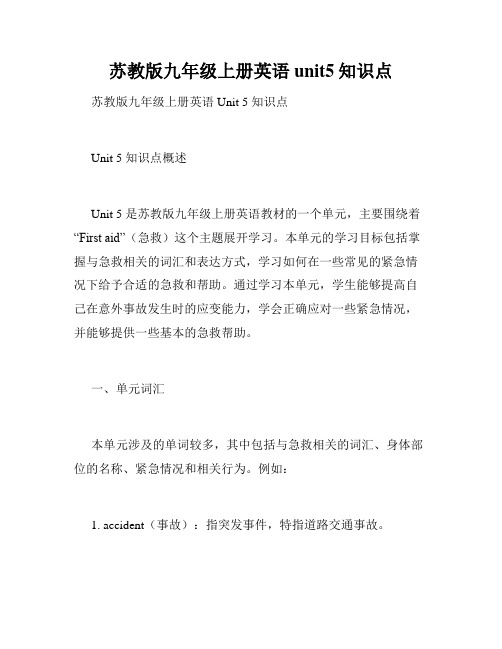
苏教版九年级上册英语unit5知识点苏教版九年级上册英语Unit 5 知识点Unit 5 知识点概述Unit 5 是苏教版九年级上册英语教材的一个单元,主要围绕着“First aid”(急救)这个主题展开学习。
本单元的学习目标包括掌握与急救相关的词汇和表达方式,学习如何在一些常见的紧急情况下给予合适的急救和帮助。
通过学习本单元,学生能够提高自己在意外事故发生时的应变能力,学会正确应对一些紧急情况,并能够提供一些基本的急救帮助。
一、单元词汇本单元涉及的单词较多,其中包括与急救相关的词汇、身体部位的名称、紧急情况和相关行为。
例如:1. accident(事故):指突发事件,特指道路交通事故。
2. emergency(紧急情况):指突发的紧急情况,需要迅速采取行动。
3. wound(伤口):指因事故或其他原因而造成身体组织受损的地方。
4. burn(烧伤):指由火、热液、蒸汽等造成的皮肤受损。
5. CPR(心肺复苏术):Cardiopulmonary Resuscitation 的缩写,是一种紧急救助措施,用于恢复突然停止心跳和呼吸的人的心脏和肺部功能。
二、语法重点在本单元中,学生将进一步学习和运用一些语法结构,以增强在紧急情况下应变能力。
以下是本单元的语法重点:1. 一般现在时:用于描述客观事实、经常性动作或习惯性动作。
2. 情态动词 can 和 should:用于表达能力、许可和建议,帮助学生学习如何给出合适的建议以及在紧急情况下采取行动。
三、交际用语在本单元中,学生将学习一些与急救相关的交际用语,以便能够在紧急情况下用英语进行交流。
以下是本单元的交际用语:1. What's the matter?(怎么了?):用于询问对方发生了什么事情。
2. Can I help you?(我可以帮助你吗?):用于主动提供帮助。
3. Take it easy.(放松点。
):用于劝慰对方冷静下来。
4. Call an ambulance.(打电话叫救护车。
人教版九年级上册英语 Unit 5 词汇与语法基础(解析版)
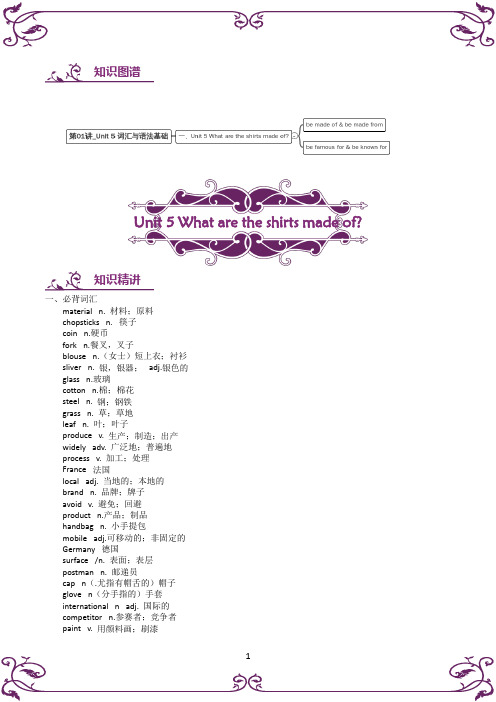
知识图谱Unit 5 What are the shirts made of?知识精讲一、必背词汇material n. 材料;原料chopsticks n. 筷子coin n.硬币fork n.餐叉,叉子blouse n.(女士)短上衣;衬衫sliver n. 银,银器;adj.银色的glass n.玻璃cotton n.棉;棉花steel n. 钢;钢铁grass n. 草;草地leaf n. 叶;叶子produce v. 生产;制造;出产widely adv. 广泛地;普遍地process v. 加工;处理France 法国local adj. 当地的;本地的brand n. 品牌;牌子avoid v. 避免;回避product n.产品;制品handbag n. 小手提包mobile adj.可移动的;非固定的Germany 德国surface /n. 表面;表层postman n. 邮递员cap n(.尤指有帽舌的)帽子glove n(分手指的)手套international n adj. 国际的competitor n.参赛者;竞争者paint v. 用颜料画;刷漆its adj. 它的form n. 形式;类型clay n. 黏土;陶土balloon n. 气球scissors n. (pl.) 剪刀lively adj. 生气勃勃的;(色彩)鲜艳的fairy n. 童话故事heat n. 热;高温polish v.磨光;修改;润色complete v. 完成二、重点词汇1. material n.1). a physical substance that things can be made from材料,原料例句:Crude oil is used as the raw (= basic) material for making plastics.原油被用作制造塑料的原料。
2). information used when writing something such as a book, or information produced in various forms to help people or to advertise products素材;资料例句:I'm collecting material for an article that I'm writing.我正在为所写的一篇文章收集素材。
九年级英语上册unit5知识要点_
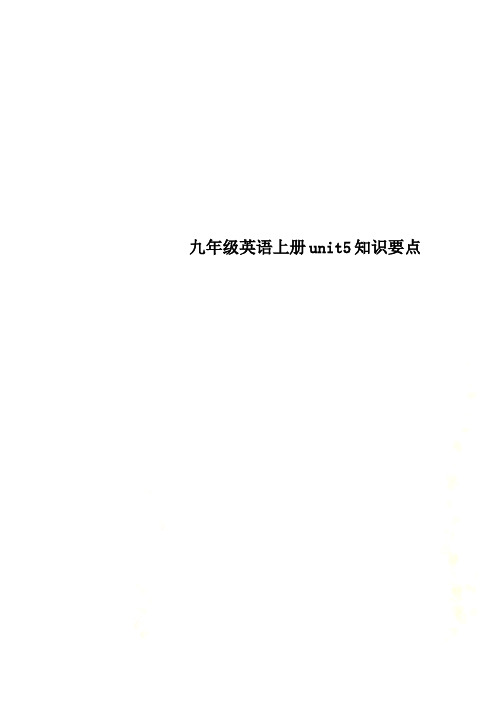
九年级英语上册unit5知识要点九年级英语上册Unit5 What are the shirts made of?一、语法被动语态(一)、什么是被动语态?英语中时态很多,但语态不多,只有两种,即:主动语态和被动语态。
所谓“被动语态”,相当于中文中常说的“被……”、“由……”的句式,如:“他的自行车被偷了。
”,“这座楼房是由他们建造的。
”(二)、被动语态的结构那么,英语中被动语态是怎么样构成的呢?请看下面的例句(注意划线部分):His bicycle was stolen.The building has been built for 20 years.通过上面的例句,可以看出,“被动语态”的构成是:be + 过去分词+ (by+动作执行者)(三)、被动语态的运用什么情况下要用被动语态呢?一般地说,有下面几种情况:1、不知道谁是动作的执行者或没有必要。
例如:Paper is made from wood. (纸是由木材生产出来的。
)The house is quite old. It was built in 1950. (这座房子太旧了。
它是1950年建成的。
) He was wounded in the fight. (他在战斗在受伤了。
)This book was published in 1981.这本书出版于1981年。
2、需要强调动作的对象时。
例如:Calculator can't be used in the maths exam.(计算器不能用于数学考试。
)Books and newspapers in the reading room must n’t be taken away. (阅览室的书籍和报纸不准带走。
)The window was broken by Mike.窗户是迈克打破的。
This book was written by him.这本书是他写的。
(四)、各种时态的被动语态举例一般地讲,被动语态可用于英语的各种时态。
人教版九年级英语上册unit5 What are the shirts made of 知识点归纳及练习

人教版九年级英语上册unit5 What are the shirts made of ?知识点归纳及练习一短语归纳1.be made of 由...制成的(表示制成成品后,仍可看出原材料是什么)2.be made from 由...制成的(在成品中已无法辨认原材料)3.be known for 以...闻名4.be used for 被用于...5.no matter 不论;无论6.be covered with 用...覆盖7.as far as i know 据我所知8.by hand 用手9.be good for 对……有益10.on the last friday of each month最后一个星期五11.be good at 擅长12.make high-technology products 制造高科技产品13.the earth’s surface 地球表面14.many different kinds of 许多不同种类的15.fly a kite 放风筝16.such as 例如17.according to 根据按照18.ask for help 请求帮助19.a symbol of ……的象征20.put……on…… 把……放在……上21.be used for 被用于做…… 22.good luck 好运23.at a very high heat 在高温下24.be made in 在……制造的25.be famous for 以……著名26.on the sides of mountains 在山腰上27.traffic accident 交通事故28.a kite festival 风筝节29.be from 来自30.turn ……into ……把……变成……31.send out 放出32.in trouble 处于困境中33.rise into 上升上涨34.paper cutting 剪纸35.be used by 被……使用36.during the spring festival 在春节期间37.sky lanterns 孔明灯38.all over the world 全世界二.用法集萃1. no matter +what / when / where =whatever / whenever / wherever “无论什么/什么时候/哪里”2. it放在find / found 后做形式宾语的用法3. It seems that +从句“好像……”4.buy sb.sth.=buy sth for sb 给某人买某物5.avoid doing sth 避免做某事6.allow sb to do sth 允许某人做某事7.want to do sth 想做某事8.learn to do sth 学会做某事9.It takes + sb. +一段时间+ to do sth做某事花费某人多长时间10.try to do sth 尽力做某事10.辨析:be made of 由...制作/制造(材料):在成品中能看出原材料be made from由...制造/制成(材料):在成品中看不出原材料be made in在...制作/制造 (产地) Made in China.中国制造例:The desk is made of wood. Bread is made of flour.The paper is made from wood. Wine is made of grapes.This kind of plane is made in China.11. be famous for 以...闻名;为人知晓be known for因...而闻名be famous as作为...而闻名be known as作为...而闻名例:Jingdezhen is famous for china.China is famous for its tourism.Mo Yan is very famous as a writer.12. allow sb to do sth允许某人做某事allow doing sthbe allowed to do sth例:Please allow me to come in.My boss doesn't allow me to use the telephone.We were not allowed to talk in class.They allowed smoking in this room only.注意:allow只可搭配动名词短语作宾语,不可直接搭用动词不定式作宾补,即只可说allow doing sth,不可说allow to do sth.13.一般现在时的被动语态(见P155页)结构:am/is/are+过去分词第五单元检测一单项选择1. Our desks are made wood, and paper is made wood, too.A. of; ofB. from; fromC. from; ofD. of; from2. — Have you heard of Weifang?— Yes, it kites.A. is known forB. is used forC. is taken forD. is named for3. — Do I have to do this thing now?— Yes, it that you don’t have much choice (选择的权利).A. saysB. looksC. seemsD. thinks4. — Chinese clay art, you should choose a very special kind of clay first.— Yes. This kind of clay is easy to shape.A. Making B. Make C. To making D. To make5. — paper cutting used during the Spring Festival?— People usually put them on doors or windows.A. Why didB. Why isC. How isD. How did6. — Are the visitors all from ?— No, there are only 5 in the group.A. Germany; GermanyB. Germany; GermansC. German; GermansD. German; Germany7. — Our English teacher always keeps his lessons .— That’s why he is so popular among his students.A. livelyB. happilyC. freelyD. friendly8. In those days, bikes were not used because few people could afford to buy one.A. quicklyB. hardlyC. widelyD. nearly9. When I asked her, she tried to avoid me.A. answeredB. answeringC. answerD. to answer10-. — The house prices in the city a lot last year.(1)— That’s true. But houses don’t sell well this year.A. roseB. are risenC. were risenD. would rise11. — Mary, will you invite your friends to your birthday party?— Yes, Mom. I have many invitations to my friends.A. given awayB. taken awayC. worked outD. sent out12. China has many special forms of traditional art, sky lanterns, papercutting and Chinese clay art. A. such as B. instead of C. except forD.because of13. I’ll finish the job, how long it takes.A. untilB. unlessC. no matterD. even though14. — Are Jiangsu and Zhejiang famous for silk?— I think so. I know,more than half of the silk in China is produced in Jiangsu and Zhejiang.A. As long asB. As far asC. As many asD. As little as15. — Kate’s allowed to chat on WeChat with her friends at home, she?— Yes. Her parents think she is old enough.A. doesn’tB. isn’tC. doesD. is16. — Mom, is it OK for me to watch TV for a while?— Sorry. Why not watch TV after your homework ?A. completesB. completedC. has completedD. is completed17. — An iPad is really a great thing.— I agree. However, . Using iPads too much has a bad influence on us.A. every dog has its dayB. the grass is always greener on the other sideC. no pains, no gainsD. every coin has two sides18. — Excuse me, sir. You to smoke here. Look at the sign “No smoking”.— Sorry. I it.A. aren’t allowed; wasn’t seenB. aren’t allowed; didn’t seeC. don’t allow; wasn’t seenD. don’t allow; didn’t see19.Pardon? I can hear you.uallyB.almostC.hardlyD.nearly20.When you are ________,I will help you.A.in trouble B.in help C.with trouble D.in hope 21 The whole city is ________ fog.A.cover with B.covered with C.cover D.covered 22.I've got several novels written by Mo Yan.You can borrow ________ if you like.A.it B.one C.every D.either23.Many trees and flowers ________ in our school every year and they make ourschool a beautiful garden.A.have planted B.are planted C.were planted D.will be planted24.—I think drinking milk every morning is good ________ our health.—Yes.I agree ________ you.A.to; to B.with; to (2) C.at; with D.for; with 25.—I think ________ good to study with a group.—I agree with you.Group work makes us study better.A.that B.it C.its D.this26.The young trees ________ every three days.A.are watered B.were watered C.are watering D.havewatered27. ---Our classroom is so clean . -----It _______every day.A. is cleanedB. was cleanedC. cleansD. cleaned28. — Do you know anything about Chinese knots (中国结)?— Yes. They are usually seen symbols of good luck.A. forB. byC. withD. as29.________ happens, I'll stand by you.A.So B.But C.Or D.No matter what 30.—Could you tell me________ at nine o'clock last night?—, I was washing clothes.A.what you were doing B.what were you doingC.what you are doing D.what are you doing二、用所给单词的适当形式填空。
九年级上册英语Unit5 知识点归纳整理
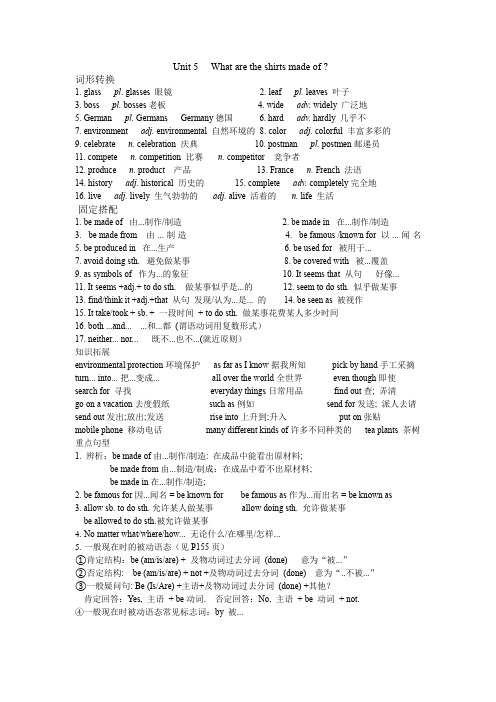
Unit 5What are the shirts made of ?词形转换1. glass ---pl. glasses 眼镜2. leaf ---pl. leaves 叶子3. boss ---pl. bosses老板4. wide ---adv. widely 广泛地5. German --- pl. Germans --- Germany德国6. hard --- adv. hardly 几乎不7. environment --- adj. environmental 自然环境的8. color ---adj. colorful 丰富多彩的9. celebrate ---n. celebration 庆典10. postman --- pl. postmen邮递员11. compete ---n. competition 比赛--- n. competitor 竞争者12. produce --- n. product 产品13. France ---n. French 法语14. history ---adj. historical 历史的15. complete --- adv. completely完全地16. live ---adj. lively 生气勃勃的---adj. alive 活着的---n. life 生活固定搭配1. be made of 由...制作/制造2. be made in在...制作/制造3. be made from由...制造4. be famous/known for以...闻名5.be produced in在...生产6.be used for被用于...7. avoid doing sth.避免做某事8. be covered with被...覆盖9. as symbols of作为...的象征10. It seems that 从句好像... 11. It seems +adj.+ to do sth. 做某事似乎是...的12. seem to do sth. 似乎做某事13. find/think it +adj.+that 从句发现/认为...是... 的14. be seen as 被视作15. It take/took + sb. + 一段时间+ to do sth. 做某事花费某人多少时间16. both ...and... ...和...都(谓语动词用复数形式)17. neither... nor... 既不...也不...(就近原则)知识拓展environmental protection环境保护as far as I know据我所知pick by hand手工采摘turn...into...把...变成... all over the world全世界even though即使search for 寻找everyday things日常用品find out查; 弄清go on a vacation去度假纸such as例如send for发送; 派人去请send out发出;放出;发送rise into上升到;升入put on张贴mobile phone 移动电话many different kinds of许多不同种类的tea plants 茶树重点句型1. 辨析:be made of由...制作/制造: 在成品中能看出原材料;be made from由...制造/制成:在成品中看不出原材料;be made in在...制作/制造;2.be famous for因...闻名= be known for be famous as作为...而出名= be known as3.allow sb.to do sth.允许某人做某事allow doing sth. 允许做某事be allowed to do sth.被允许做某事4.No matter what/where/how... 无论什么/在哪里/怎样...5.一般现在时的被动语态(见P155页)①肯定结构:be (am/is/are) + 及物动词过去分词(done) 意为“被...”②否定结构: be (am/is/are) + not +及物动词过去分词(done) 意为“..不被...”③一般疑问句: Be (Is/Are) +主语+及物动词过去分词(done) +其他?肯定回答:Yes, 主语+ be动词. 否定回答:No, 主语+ be动词+ not.④一般现在时被动语态常见标志词:by 被...。
Unit 5 知识清单(预习 复习 知识点详解)-牛津译林版九年级英语上册
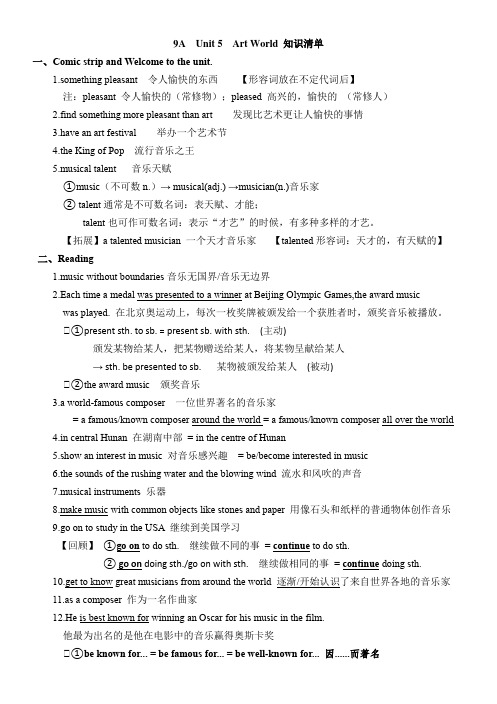
9A Unit 5 Art World 知识清单一、Comic strip and Welcome to the unit.1.something pleasant 令人愉快的东西【形容词放在不定代词后】注:pleasant 令人愉快的(常修物);pleased 高兴的,愉快的(常修人)2.find something more pleasant than art 发现比艺术更让人愉快的事情3.have an art festival 举办一个艺术节4.the King of Pop 流行音乐之王5.musical talent 音乐天赋①music(不可数n.)→ musical(adj.) →musician(n.)音乐家② talent通常是不可数名词:表天赋、才能;talent也可作可数名词:表示“才艺”的时候,有多种多样的才艺。
【拓展】a talented musician 一个天才音乐家【talented形容词:天才的,有天赋的】二、Reading1.music without boundaries音乐无国界/音乐无边界2.Each time a medal was presented to a winner at Beijing Olympic Games,the award musicwas played. 在北京奥运动上,每次一枚奖牌被颁发给一个获胜者时,颁奖音乐被播放。
★①present sth. to sb. = present sb. with sth. (主动)颁发某物给某人,把某物赠送给某人,将某物呈献给某人→ sth. be presented to sb. 某物被颁发给某人(被动)★②the award music 颁奖音乐3.a world-famous composer 一位世界著名的音乐家= a famous/known composer around the world = a famous/known composer all over the world4.in central Hunan 在湖南中部= in the centre of Hunan5.show an interest in music 对音乐感兴趣= be/become interested in music6.the sounds of the rushing water and the blowing wind 流水和风吹的声音7.musical instruments 乐器8.make music with common objects like stones and paper 用像石头和纸样的普通物体创作音乐9.go on to study in the USA 继续到美国学习【回顾】①go on to do sth. 继续做不同的事= continue to do sth.② go on doing sth./go on with sth. 继续做相同的事= continue doing sth.10.get to know great musicians from around the world 逐渐/开始认识了来自世界各地的音乐家11.as a composer 作为一名作曲家12.He is best known for winning an Oscar for his music in the film.他最为出名的是他在电影中的音乐赢得奥斯卡奖★①be known for... = be famous for... = be well-known for... 因......而著名★②be known as... = be famous as... = be well-known as... 作为......(身份)而著名★③be known/well-known to... 为......(人)所熟知Eg: Mountain Mao is known to the people all over China. 茅山为全中国人所熟知。
九年级上册英语unit5知识点
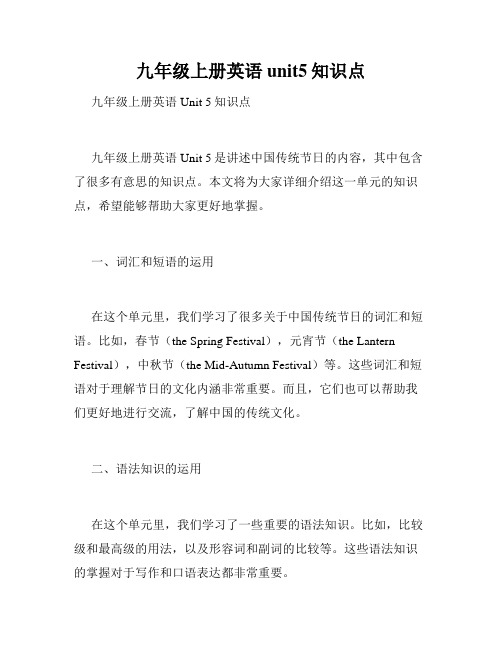
九年级上册英语unit5知识点九年级上册英语Unit 5知识点九年级上册英语Unit 5是讲述中国传统节日的内容,其中包含了很多有意思的知识点。
本文将为大家详细介绍这一单元的知识点,希望能够帮助大家更好地掌握。
一、词汇和短语的运用在这个单元里,我们学习了很多关于中国传统节日的词汇和短语。
比如,春节(the Spring Festival),元宵节(the Lantern Festival),中秋节(the Mid-Autumn Festival)等。
这些词汇和短语对于理解节日的文化内涵非常重要。
而且,它们也可以帮助我们更好地进行交流,了解中国的传统文化。
二、语法知识的运用在这个单元里,我们学习了一些重要的语法知识。
比如,比较级和最高级的用法,以及形容词和副词的比较等。
这些语法知识的掌握对于写作和口语表达都非常重要。
三、阅读理解和听力技巧这个单元里的阅读理解和听力部分是帮助我们提高对英语的理解和运用能力的重要途径。
通过阅读和听力练习,我们可以更好地理解文章的主旨和细节,提高对语言的理解能力。
四、文化差异的认识本单元以中国传统节日为主题,所以我们在学习的过程中也会涉及到一些中西方文化的差异。
比如,在中国,过年是最重要的节日,家人会团聚在一起,共度美好时光。
而在西方,圣诞节是最重要的节日,人们会交换礼物,庆祝新年的到来。
通过了解这些文化差异,我们可以更好地与其他国家的人进行交流和交往。
五、作文写作和口头表达的能力培养在九年级上册英语的Unit 5中,我们会进行一些作文写作和口头表达方面的练习。
通过这些练习,我们可以提高自己的写作和口头表达能力,增强自信心。
六、课外扩展和联想除了教科书上的内容,我们还可以通过课外的扩展阅读来进一步了解有关中国传统节日的知识。
可以看一些与传统节日相关的书籍、文章,或者观看相关的纪录片,在网上搜索一些有关中国传统节日的资料,增加我们对中国传统文化的了解。
在学习这一单元的过程中,我们不仅仅是学习了知识点,更多地是培养了我们的综合运用能力。
九年级上册英语单元复习(Unit 5 What are the shirts made of)

Unit 5 What are the shirts made of?满分120分一、单项填空(共11分)1.The reading room ________ yesterday afternoon.A.cleaned B. is cleaned C. was cleaning D. was cleaned2.The pen ________ well.A.writesB. is writtenC. was writtenD. writing3. The villagers _______ lots of trees every year to protect their farmland.A. cutB. plantC. are cutD. are planted4.—Tom often makes his little sister______.—Don't you know his little sister was made______ by him just now?A.cry; cryB. to cry; to cryC. to cry; cryD. cry; to cry5.—China is getting stronger and stronger.—Yes. So Chinese by more and more foreigners.A.learnB. learnedC.is learnedD. was learned6 —Will you go to Lisa’s housewarming party next Sunday?—Well, if I , I will go on time.A.inviteB. will inviteC.am invitedD. will be invited7.You lunch at school. So you don’t have to bring your own food.A. giveB. will giveC. are givenD. have given8.Now waste from daily life in the city of Shanghai to be separated into four different groups.A.is requiringB.is requiredC. was requiredD. required9. This kind of iPad _______ in our computer shop. It _______ very well.A. is sold; sellsB. sells; is soldC. sells; sellsD. is sold; is sold10. He likes collecting stamps. Most of his money on stamps.A. has spentB. spendsC.is spentD. spent11. You must be careful when you cross the street — the _______ is very heavy in the rush hour.A. stormB. environmentC. trafficD. business二、根据句意及首字母提示补全单词(8分)1.My head is so big, but this c is so small.2.There was heavy t on the roads, so we moved slowly.3.My uncle is a p .He delivers(送) letters to others.4.G is spoken in Germany.5.We all know different m are made into different products.6.Jack always wears a pair of (手套) in winter.7.Armstrong was the first person to walk on the (表面) of the moon.8.My sister reads some (日常的) English every morning.三、用所给单词的适当形式填空(30分)1.Mary was born in a small town in (German).2.One of the (boss) donated one million dollars in the show.3.English widely (use) all over the world.4.The popular TV program A Bite of China(watch) everywhere in China.5. 3. A young man often _________________ (ask) me some difficult questions.6.A boy kicked his football against the window yesterday and now the window was (break).7.—Your classroom looks clean and tidy.—Yes, it (clean) every day.8. Is our school (visit) by many people every day?9. Tom ___________(use) computer every Saturday.10.Those (Germany) are all very interested in the Chinese culture.11.V enice is a___________(beauty)city full of culture and history.12.___________(accord) to the law, traffic must keep to left in England.13.As a child, I got angry ___________(easy) and was not good at communication with others.14. Mother ___________________ (tell) me a story every night.15.Most of the rice (grow) in the south of China.四、按照要求改写句子(20分)1.The Greens planted about 20 trees last week.(变成被动语态)2.Simon will finish the plan tomorrow.(变成被动语态)3.People use WeChat to talk now.(变成被动语态)4.Have people in China spoken Chinese for thousands of years?(变成被动语态)5.Did Tina repair anything just now?(变成被动语态)6.It's great fun to have a talk with you.(变成感叹句)7.The reading room is very large in our school. 200 students can read in it.(用so...that...变成主从复合句)8.I spent 3 days finishing the task.(用it改写成同义句)9.He can hardly finish his homework,_______________?(附加反义疑问句)10. the, is, handbag, made, by hand(连词成句)五、根据汉语意思完成句子(16分)1. 这枚戒指是银制的。
人教版九年级英语上册(Unit5单词 短语 句式 知识梳理 精讲)

Unit5 01单词词汇chopsticks [ˌtʃɔpstiks] n. 筷子.coin [kɔin] n. 硬币fork [fɔ:k] n. 餐叉,叉子.blouse [blauz] n.(女士)短上衣;衬衫.sliver [silvə] n. 银,银器; adj.银色的 .glass [glas] n .玻璃cotton ['kɒtn] ['kɑ:tn] n. 棉;棉花.steel [sti:l] n. 钢;钢铁.fair [feə(r)] [fer] n.展览会;交易会 adj.公平的environmental [ɪnˌvaɪrənˈmentl] adj.自然环境的;有关环境的grass [ɡrɑ:s] [ɡræs] n. 草;草地leaf [li:f] n.(pl. leaves [li:vz])叶,叶子produce [prə'dju:s] v. 生产;制造;出产 .widely [ˈwaidli] adv. 广泛地;普遍地 .be known for 因……闻名;为人知晓process [prəuses] v. 加工;处理;过程.Park 包装;装箱product [ˈprɒdʌkt][ˈprɑ:dʌkt] n. 产品;制品France [fra:ns], [fræns] 法国 .no matter 不论;无论 .local [ˈləukl] adj. 当地的;本地的 .brand [brænd] n. 品牌;牌子avoid [əˈvɔid] v. 避免;回避 .handbag [ˈhændbæg] n. 小手提包mobile [ˈməubail] adj.可移动的;非固定的everyday ['evrideɪ] adj. 每天的;日常的boss [bɒs] [bɔ:s] n. 老板;上司Germany [ˈdʒə:(r)məni] n. 德国 .surface [sə:(r)fis] n. 表面;表层.material [məˈtiəriəl] n. 材料;原料 .traffic [ˈtræfɪk] n. 交通;路上行驶的车辆postman [ˈpəustmən] n. 邮递员. cap [kæp] n(尤指有帽舌的)帽子glove [glʌv] n(分手指的)手套 .international [ˌintə(r) ˈnæʃnəl] adj. 国际的competitor [kəmˈpetitə(r)] n. 参赛者;竞争者its [its] adj. 它的form [fɔ:(r)m] n. 形式;类型clay [klei] n. 黏土;陶土celebration [ˌselɪˈbreɪʃn] n. 庆典;庆祝活动balloon [bəˈlu:n] n. 气球 .paper cutting 剪纸scissors [ˈsizə(r)z] n. (pl.) 剪刀lively [ˈlaivli] adj. 生气勃勃的;(色彩)鲜艳的fairy [ˈfeəri] [ˈferi] tale [teil] n 童话故事historical [hɪˈstɒrɪkl] adj.(有关)历史的heat [hi:t] n. 热;高温 v. 加热,变热polish [ˈpɒlɪʃ][ˈpɑ:lɪʃ] v. 磨光;修改;润色complete [kəmˈpli:t] v. 完成Korea [kəˈri:ə] 朝鲜;韩国Switzerland [switsə(r)lənd] 瑞士San Francisco [ˌsæn frənˈsiskəu] 圣弗朗西斯科(旧金山,美国城市)Marcus [ˈmɑ:kəs] n. 马库斯(男子名)Pam [pæm] 帕姆(女名)Unit5 02词汇精讲1. everyday; every day(1)everyday作形容词,意为“每天的,日常的,平日的”。
人教版九年级英语上册课件:Unit 5单元知识归纳(共11张PPT)

• 5.both in the past and now 在过去和现 在
• 6.as far as I know 就我所知…… • 7.on the sides of mountains 在山坡上
• 8.pick by hand亲手采摘 • 9.be good for对……有好处 • 10.no matter 不论;无论 • 11.things made in China 中国制造的东
• 4.No matter what you may buy,you might think those products were made in those countries.
• 无论你买什么,你也许会认为那些产品 是在那些国家制造的。
• 5.The international kite festival is held in April every year.
• 国际风筝节在每年的四月举行。
• 6.They are seen as bright symbols of happiness and good wishes.
• 它们被看作幸福和美好祝愿的光明象征。
• 7.These small pieces of clay art show the love that all Chinese people have for life and beauty.
词)competitor/competition
• Ⅱ.重点短语 • 1.be made of/from 由……制成 • 2.be made in 在某地被制造 • 3.the art and science fair科学艺术展 • 4.be famous for/be known for以……闻
人教版九年级上册英语unit5知识点
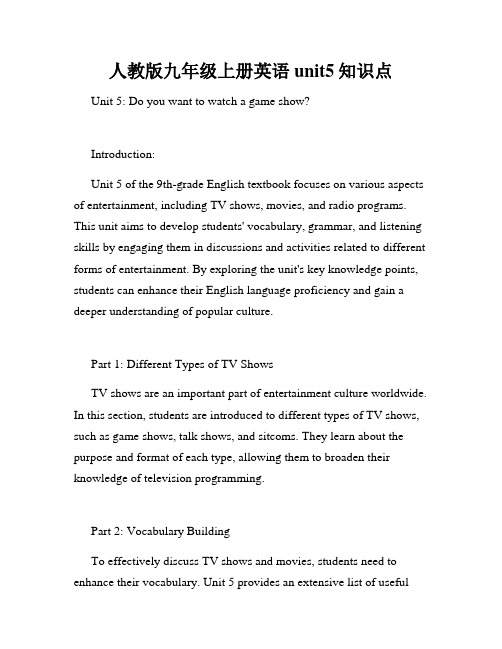
人教版九年级上册英语unit5知识点Unit 5: Do you want to watch a game show?Introduction:Unit 5 of the 9th-grade English textbook focuses on various aspects of entertainment, including TV shows, movies, and radio programs. This unit aims to develop students' vocabulary, grammar, and listening skills by engaging them in discussions and activities related to different forms of entertainment. By exploring the unit's key knowledge points, students can enhance their English language proficiency and gain a deeper understanding of popular culture.Part 1: Different Types of TV ShowsTV shows are an important part of entertainment culture worldwide. In this section, students are introduced to different types of TV shows, such as game shows, talk shows, and sitcoms. They learn about the purpose and format of each type, allowing them to broaden their knowledge of television programming.Part 2: Vocabulary BuildingTo effectively discuss TV shows and movies, students need to enhance their vocabulary. Unit 5 provides an extensive list of usefulwords and phrases related to entertainment. From adjectives that describe movies to verbs associated with TV watching, students learn how to express their preferences, opinions, and experiences in English.Part 3: Talking About PreferencesUnderstanding and expressing personal preferences is an essential skill in everyday life. This section introduces students to expressions and sentence structures used to discuss preferences when it comes to TV shows, movies, and other forms of entertainment. By engaging in role plays and group discussions, students can practice using these expressions in real-life scenarios.Part 4: Celebrity GossipCelebrity culture is a significant aspect of modern entertainment. Unit 5 provides an opportunity for students to develop their listening skills by listening to celebrity interviews and radio programs. By doing so, they learn about the lives of famous individuals and improve their ability to comprehend spoken English in a real-world context.Part 5: Writing a Film ReviewWriting is an essential skill that students need to cultivate in their English language learning journey. This section guides students inwriting film reviews, enabling them to express their opinions, critique movies, and provide recommendations. By engaging in this activity, students not only enhance their writing skills but also develop their analytical thinking abilities.Conclusion:Unit 5 of the 9th-grade English textbook offers a comprehensive exploration of various aspects of entertainment. By delving into different types of TV shows, building their vocabulary, discussing preferences, listening to celebrity interviews, and writing film reviews, students gain a well-rounded understanding of entertainment culture in the English-speaking world. These activities and discussions provide students with opportunities to improve their language skills, critical thinking abilities, and cultural awareness. As they progress through the unit, students become more proficient in expressing themselves in English and develop a deeper appreciation for the significance of entertainment in our lives.。
- 1、下载文档前请自行甄别文档内容的完整性,平台不提供额外的编辑、内容补充、找答案等附加服务。
- 2、"仅部分预览"的文档,不可在线预览部分如存在完整性等问题,可反馈申请退款(可完整预览的文档不适用该条件!)。
- 3、如文档侵犯您的权益,请联系客服反馈,我们会尽快为您处理(人工客服工作时间:9:00-18:30)。
九年级英语上册Unit 5复习名师导引一、重点词actress mourn effort enter industry attract novel lead shortly lifetime well-known final environment devote president peacefully last star terrible二、重点词组1.one of Hollywood’s favour ite actresses 好莱坞空前受欢迎的女演员之一2. mourn the loss of a great beauty 为失去一位大美女而哀痛3. put one’s effort into … 全神贯注于……之中4. be made into a play 被改编成一部戏剧5. attract one’s attention 吸引了某人的注意力6. make her final appearance in films 在电影中最后一次亮相7. mark the beginning of her successful career 标志着她成功事业的开端8. play the lead of an angel 扮演一位天使的角色9. devote much of her time to (doing) sth. 把她的许多时间奉献给……10. the first one to arrive at the cinema 第一个到达电影院的人11. fall in love with 爱上……12. tak e an actor’s training course 参加演员培训班课程13. be experienced in acting 在表演方面有经验14. arrive out of breath 气喘吁吁地到达三、重点句型1. She is famous not only in the USA, but also in other parts of the world.她不但在美国出名,而且在世界上其它地方也有名。
2. Her dream was to become a successful ballet dancer.她的梦想是成为一名成功的芭蕾舞演员。
3. She wanted to remind us that we should protect the environment by showing us the beauty of nature.她想通过向我们展示大自然的美来提醒我们要保护环境。
4. They have a bad effect on people, especially teenagers.它们对人们有不良影响,尤其是青少年。
四、语法1.过去完成时(1)构成:助动词 had +动词的过去分词(2)过去完成时表示在过去某时或某个动作之前发生的动作或存在的状态。
如:The film had begun when we got to the cinema.(3)过去完成时表示过去某一时间以前开始一直持续到那个时间并可能延续下去的动作,常和by,since ,for引导的表时间的从句或短语连用。
如:The train had been away for two minutes by the time they arrived.2.用合适的情态动词表达你的观点我们可用“应该(should, ought to),最好(had better)”向朋友提建议。
根据具体情况也会用“必须(must),只好(have to)”向别人提出一些事件的想法。
其中,should,ought to, had better,语气较委婉;have to和must语气较强。
也可用Why not,Why don’t you, perhaps表达建议。
如:Mum often says that I should watch less TV on weekdays.You’d better not open the window because we all feel a bit cold.Students must hand in their homework on time every day.We’ll have to revise English tonight because of the test tomorrow.基础整合第I卷一、听力选择(共20题,每小题1分,计20分)(A)回答问题听下面六个问题,从题中所给的A,B,C三个选项中选出最佳选项,并标在试卷相应位置。
每个问题读两遍。
1. A. Hold on, please. B. I’m Mr. Smith. C. No, thanks.2. A. Is that so? B. Good idea. C. Not at all.3. A. The farm and the people.B. It’s about a poor, kind-hearted man.C. Boring.4. A. You don’t want to tell me.B. I’m a stranger, too.C. Thank you all the same.5. A.Don’t say so. B. You are right. C. You are welcome.6. A.It was Sunday. B. It was sunny. C. It is cloudy.(B)对话理解听下面九段对话。
每段对话后有一个小题,从题中所给的A, B, C三个选项中选出最佳选项,并标在试卷相应位置。
每段对话读二遍。
7. What’s wrong with Dick?A. Something is wrong with his hand.B. Something is wrong with his head.C. Something is wrong with his legs.8.What are they going to do tomorrow morning?A. They are shopping.B. They are going to work in the zoo.C. They are going to visit the wild animals zoo.9. When will they have an English party?A. Friday.B. Thursday.C. Wednesday.10. How many tickets have Mike and Jane got altogether?A. Fifteen.B. Thirty—two.C. Seventeen.11.Where is Miss Zhao?A. In the reading—room.B. In the language room.C.In the computer room.12.What does David’s father do?A. He is a doctor.B. He is a driver.C. He is a farmer.13. What are the man and the woman talking about?A. About the food.B. About the weather.C. About the work.14.What is the man perhaps going to do ?A. To write a letter to Mr. White.B. To see Mr. White himself.C. To call Mr. White by phone.15. Where does the conversation probably take place?A. In a restaurant.B. In a library.C. In a bookshop.(C)短文理解听下面的短文,短文后有五个小题,从题中所给的A, B, C三个选项中选出最佳选项,并标在试卷相应位置。
短文读二遍。
16. What did the Frenchman come to England to do ?A. To visit his friend.B. To study English.C. To read books.17. Where did the Frenchman live in England?A. Near a bird cage.B. In a language school.C. In an old lady’s home.18. What did the Frenchman often do in the morning?A. He sat in the garden.B. He saw the bird.C. He did some reading.19. Where was the bird cage often hung in the morning?A.On the tree in the garden.B.On the window upstairs.C.Either on the tree in the garden or on the window upstairs.20. What happened to the old lady one morning?A. She dropped her cage.B. She fell off the window.C. Her bird flew away.二、选择填空A)单项填空(共15题,每小题1分,计15分)21. Last weekend, I went to see a film _______Gong Li with my parents.A. starsB. starredC. starringD. is starring22. Paul didn’t listen as __________ as Jimmy in class, so he made more mistakes in his exercises.A. more carefulB. more carefullyC. carefullyD. careful23. The film, Tales of Old Beijing, shows us _______ Beijing looked like many years ago.A. whatB. howC. thatD. which24. Chen Kun’s fi rst album (唱片)will _________ in November.A. get outB. give outC. put outD. come out25. To our surprise, the thief is a _________ boy.A. 12 year oldB. 12-year-oldC. 12 years oldD. 12-years-old26. My father said he _____________ for Shanghai the next day.A. was going to leaveB. is going to leaveC. leftD. had left27. I found him ________, for he found the answer to the question___________.A. cleverly …. easilyB. clever …. easyC. clever ….. easilyD. clever ….. easy28. What he said made me ________________.A. to feel excitedB. feel excitingC. feel excitedD. felt excited29. Do you know _________?A. who is he talkingB. who was he talkingC. who he is talkingD. who he is talking to30. The film _______ for half an hour when I got to the cinema yesterday.A. has begunB. has been onC. had begunD. had been on31. I don’t like _______ very much. I’d rather _________ a doctor.A. teach, to beB. to teach, beC. teaching, beD. teaching , being32. ---Don’t pick flowers in the second garden next time, Bill.--- ___________A. Don’t worry.B. S orry, I won’t.C. Is t hat so?D. I have no idea .33.They never knew what ________ to the world in a hundred years.A. will happenB. would happenC. had happenedD. have happened34. That old man died ____________ the age of eighty.A. onB. inC. withD. at35. The number of the workers in the factory ___________ about two hundred.A. isB. am C . are D. be(B)完形填空(共10小题,每小题1分,计10分)阅读下面短文,掌握其大意,然后从36—45各题所给的四个选项(A、B、C和D)中,选出最佳选项。
